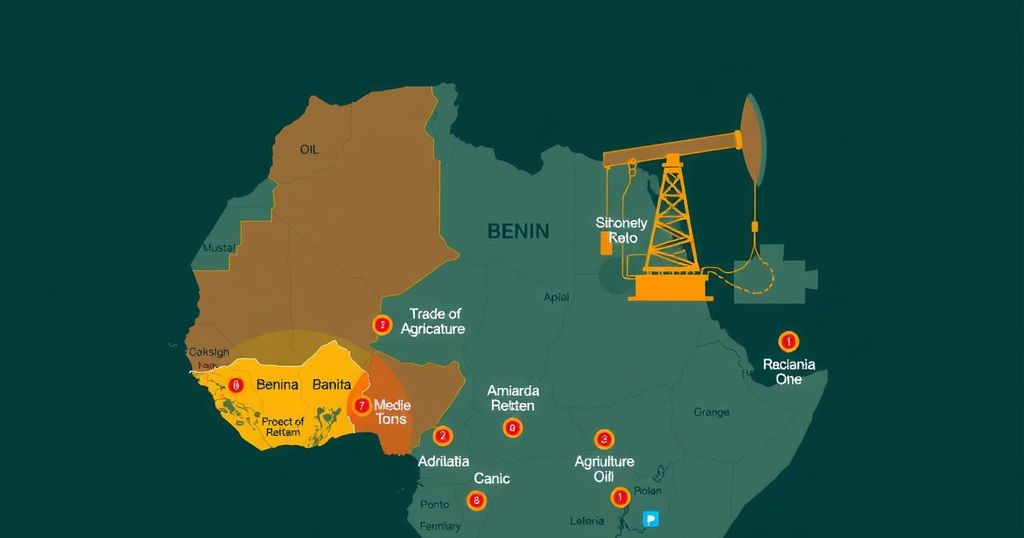Overview of Benin’s Economy: Historical Challenges and Current Opportunities

Benin’s economy is heavily reliant on external support, particularly from France, leading to chronic economic stagnation. After a regime change in 1972, attempts were made to nationalize sectors and reduce foreign dependency, yet corruption remained high. Agriculture supports the majority, with cotton and other crops as key exports. The economy has began shifting towards privatization, highlighting opportunities for industry growth and trade.
Benin’s economy has been significantly shaped by its historical reliance on external support since gaining independence, mainly from France and various international organizations. This assistance has alleviated some burdens of economic stagnation, yet the majority of the population endures a low standard of living. Following a coup in 1972, a regime attempted to shift towards socialism, nationalizing various sectors and pivoting economic relations towards socialist countries, including the Soviet Union. However, despite this restructuring, corruption persisted, and the economy saw little improvement. The shift towards liberalization in the mid-1980s similarly did not yield significant benefits, leading to a move towards privatization in the early 1990s.
Natural resources in Benin include dwindling tropical forests rich in hardwoods, abundant fish in its rivers and lagoons, and several mineral deposits such as iron ore and marble. Notably, offshore oil was discovered in 1968, with production beginning in 1982. Approximately 70 percent of the working population is engaged in agriculture, achieving self-sufficiency in staple foods while cotton, peanuts, and cocoa dominate cash crop production. Livestock and fishing, particularly shrimp and deep-sea fishing, have also seen increased activity, catering largely to exports.
Benin’s industrial landscape comprises several processing plants, including those for palm oil and cotton, alongside facilities for cement, textiles, and other products. Electricity generation primarily relies on thermal plants, with some imports from Ghana. The transition from state-owned banks to private institutions in the late 1980s marked significant financial reform, driven by increased foreign investment and aid, particularly from the United States and the European Union.
Trade in Benin largely revolves around agricultural exports, particularly cotton and palm oil, with informal economic activity, such as smuggling, impacting the trade balance. The country’s strategic deepwater port at Cotonou facilitates trade for neighboring Niger and Nigeria, presenting an opportunity for revenue through customs duties. Benin imports a diverse array of goods from various nations, including machinery and consumables.
Transportation infrastructure remains limited, featuring two primary road networks and rail links, but many routes become less passable during the rainy season. The navigable coastlines support small craft, while the international airport in Cotonou connects Benin to Africa and Europe. As the nation continues to evolve economically, addressing corruption and enhancing trade efficiencies remain vital for future growth.
The economy of Benin is characterized by its historical reliance on external financial aid, which has allowed it to address some of the challenges associated with poverty and economic stagnation within the country. Following major political changes and the influence of socialist ideologies in the late 20th century, the economy underwent several transformations, including nationalization and later privatization of key sectors. Agricultural productivity has played a crucial role in supporting the livelihoods of the majority of the population, while Benin’s rich natural resources provide a foundation for industrial development.
In summary, Benin’s economic landscape has seen significant shifts from dependence on foreign aid to the promotion of private sector growth. Despite challenges such as corruption and infrastructural limitations, the agricultural sector remains vital, fostering self-sufficiency and export opportunities. The strategic utilization of its natural resources, coupled with beneficial trade relationships through its port at Cotonou, positions Benin for potential growth as it continues to reform its economy and strengthen its trade networks.
Original Source: www.britannica.com








